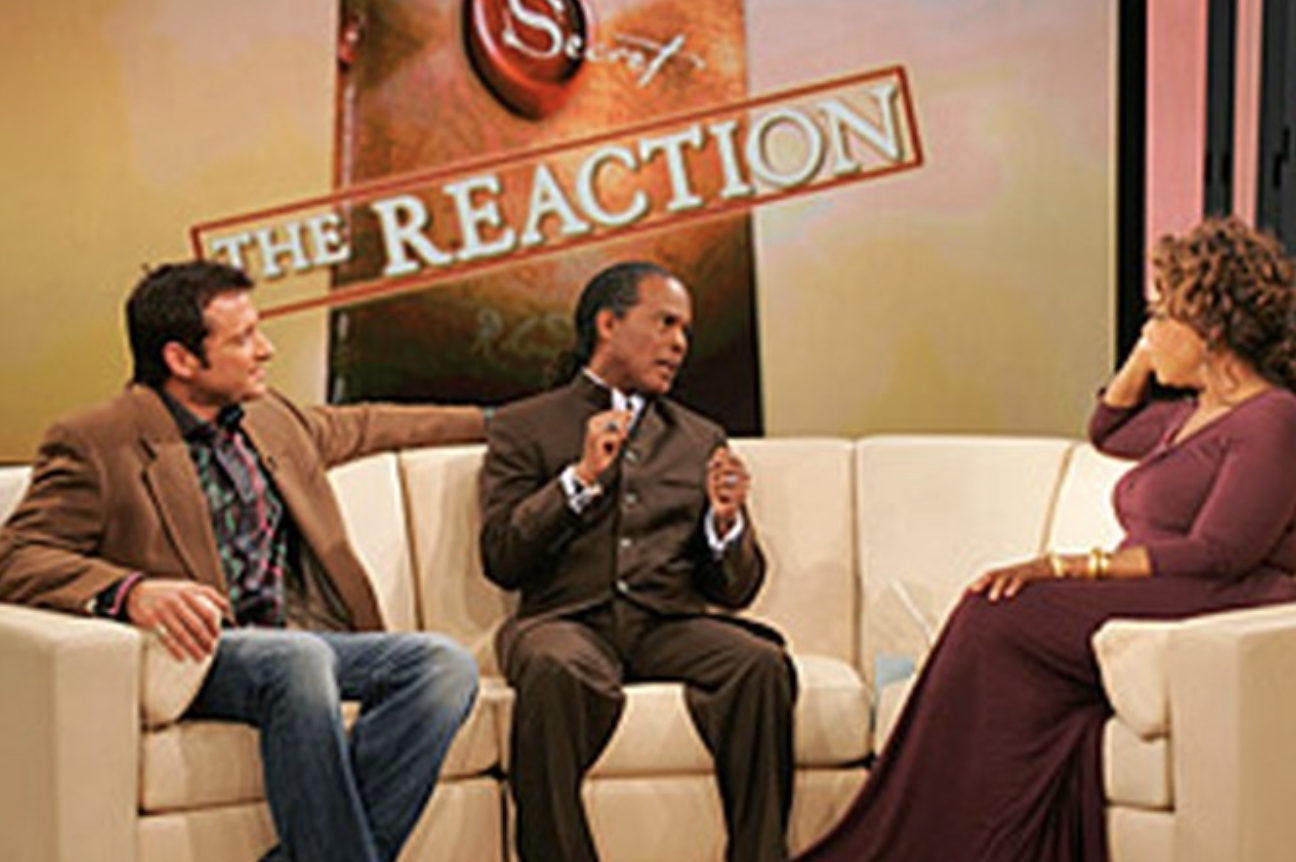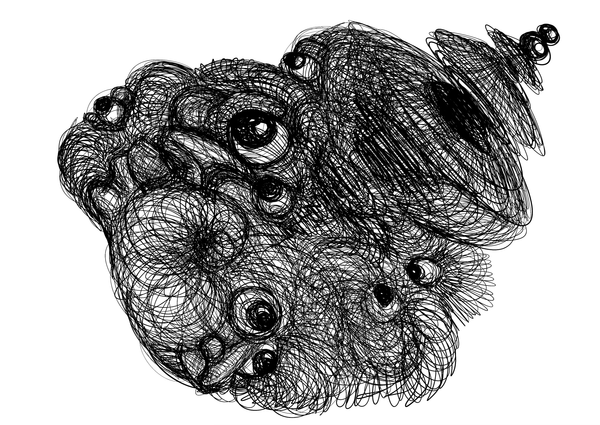The Cult of Self-Improvement
Joshua Drummond looks at our obsession with self-improvement.

Hi,
I wanted to thank everyone who responded to A New Day, a New Cease & Desist over the last five days or so. So many readers have brushed up against MLMs — and they’re something I want to push further into.
Did I hear from good old Jonathan Callinan, the chap who was recruiting new people for WEWE?
I did — and he appeared to switch from “Here Are Scary Legal Threats” mode to “I Am Going To Be Smarmy” mode:
Dear David,
I totally understand the importance of transparency which is why I emailed you a number of links to the various companies and their apps currently established and operating within the LYOPAY ecosystem (the company behind WeWe Global), but you seem to have omitted this information from your entertaining posts to date?!
Since you have refused to remove your original and factually incorrect article, please at least include the accessible links below within your next post in the name of FULL transparency, and thus allowing your paying subscribers to do their own FACTUAL research into the LYOPAY ecosystem.
I didn’t post copious links to LYOPAY because it’s not worth anyone’s time, and I don’t want any Webworm readers to fall into cursed MLM + cryptocurrency land. For anyone that cares, you can Google it.
He went on, ending with:
Look forward to your next piece containing all of the info above, and proving that you are a legit investigative journalist.
Kind regards,
Jonathan
It’s funny — David D’Amato, Michael Organ, various megachurch leaders — they all make weird digs at my journalism. It’s born from the Trumpian “fake news” refrains that have become forever lodged in many grifter’s brains. They see it as their get-out-of-jail-free card.
Despite his email rambling on about how there is apparently no funny business going on — Jonathan also decided to delete all his presentations/recruitment drives for WEWE videos off his YouTube. How strange.

I also quickly looked at Jonathan’s Instagram page, and wasn’t overly surprised to see he’s fallen down the conspiracy theory rabbit hole.
There’s this very strange overlap in the world of prosperity-doctrine obsessed megachurches, the covid conspiracy crowd, the crypto crowd and the MLM crowd. I am still working on the Venn diagram, but a clear appeal to all these things is the discovery of secret life-changing knowledge — paired with an underlying distrust of “the world”.
It’s that old-school mentality of grabbing your .22 rifle and heading for the hills.

Anyway — with all that in mind, I wanted to throw over to Webworm contributor Joshua Drummond, who wants to talk about another scam: Self-improvement.
Like all of Josh’s essays, I love this one very much.
David.
Self-improvement
by Joshua Drummond.
I know your most cringe-worthy secret.
Don’t worry. It’s not just you. I do it too. And evidence suggests that so does everyone else.
Obviously, I am talking about self-improvement.
People have been obsessing about self-improvement for a long time. The book that created and named the self-help genre, Self-Help, was written in 1859, by a Scottish ex-journalist called Samuel Smiles who Wikipedia describes as “not very successful in his careers.” But it goes much further back than that. In fact, the oldest book anyone knows about might actually be a self-help book.
The Instructions of Shuruppak is so ancient it predates even the Epic Of Gilgamesh, widely considered the first story ever written. Shuruppak, along with similar texts like the Bible’s book of Proverbs, are examples of what’s called “wisdom literature.” In other words: self-improvement. The Instructions of Shuruppak has an English translation, so here are some highlights from timeless wisdom. Unfortunately, said timeless wisdom comes to us in the form of ancient cuneiform tablets, which means it has some illegible gaps, here indicated by (????) For fun, please feel free to insert your own words in these bits:
- You should not buy a donkey which brays; it will split (????) your midriff.
- You should not (????) yourself.
- You should not play around with a married young woman: the slander could be serious.
- You should not buy a donkey at the time of harvest
- A donkey which eats (????) will (????) with another donkey
Admittedly, a lot of Shuruppak is donkey-centric in a way that most modern self-help literature is not. But there is still plenty in there that wouldn’t look out of place in modern classics like The Seven Habits of Highly Effective People. “You should not curse strongly: it rebounds on you. You should not speak improperly; later it will lay a trap for you.”
It seems our obsession with self-improvement has been with us as long as we’ve been us, and we’ve channelled that desire into print for as long as we’ve been able to write. Self-help is the best-selling genre in literature by a wide margin. If you lump in religious texts (which is arguably self-improvement en masse) the margin is so wide it’s practically immeasurable.
It makes sense. Life is often hard and complex, and it’s human nature to seek out the experience of others and learn from it — especially when that knowledge can be usefully condensed into written form. One could argue that the urge to improve oneself is a fundamental part of human nature, and that self-help literature is an inevitable result. Perhaps it goes even deeper. Might religion itself be part of this fundamental human instinct, the urge to improve, to seek company, and to search for meaning — all in one potent, intoxicating brew?
Who the fuck knows? What I want to know is: does any of this stuff work?

If you’re anything like me, and you probably are to some extent (sorry) you’ll have read self-improvement stuff. If you are even more like me, you’ll have read a lot of it. You might have given some form of self-improvement a decent hoon, with mixed results.
You’re probably familiar with the exultant rush of picking up a new extravagantly-titled tome, of the buzz of possibility, the epiphanic refrain of “aha, this will fix it!” sounding somewhere in your head as you excitedly tear through the pages – perhaps in competition with another voice that says, wearily, “Oh no, here we go again. You know this is all bullshit, right?”
Live long enough, and the urge to self-improve might become all-encompassing, bordering on compulsion. Speaking from experience, men aged 30 through 50 are prime targets for self-improvement pitches, although a casual browse through the self-help section at a bookshop or library will reveal that other genders or age-groups are just as prone.
The internet is full of websites and newsletters specifically dedicated to the art of self-improvement; the lifestyle sections of newspapers and news sites reverberate with it. There’s just so much out there. It’s less a rabbit-hole and more an open-cast mine. Here are just some examples of what I’ve noticed, dabbled in, or made a proper go of; you may recognize a few.
Mindfulness:
You can’t move without tripping over mindfulness. Our brains are stuffed with it. Our workplaces promote it. Is it actual science or a corporate scam to keep us docile under the increasingly absurd ravages of late-stage capitalism?
Diets:
So many diets. If you tried them all, you’d explode. There’s a low carb diet, and a slow-carb diet. There’s paleo, which purports to ape the eating habits of our Palaeolithic ancestors, before agriculture ruined everything (citation needed). The ancestor of these diets, of course, is the ketogenic diet, which was designed to help chronic epilepsy in children but also has the side-effect of rapid weight loss.
But weight, there’s more. There’s Jenny Craig and Weight Watchers and the Swedish Belly Fat Diet (points for specificity). There are no-sugar diets and all-meat diets and something called Instinctive Eating which, to me, sounds like an all-carb diet. Too intense? Perhaps you need…
Drugs:
Start with a drug so popular it’s now legal to sell in purpose-made, legal dispensaries (caffeine, naturally). Also legal is the ability to temporarily remove vast cross-sections of brain functionality with alcohol. If you’re not one to worry about arbitrary, occasionally-brutally-enforced boundaries, you can have any drug you like.
According to Netflix’s “How To Change Your Mind” what my life is missing is either LSD, psilocybin, or another episode I haven’t watched yet. Then there’s the legal pharmacopoeia to pick from. Depressed? Anxious? Terminally distracted? All of them all at once? There’s a pill for that.
Yes, that’s a lot to take. It’s okay. Just…
Breathe:
Actually, don’t! You might be doing it wrong. According to any number of popular self-help and wellness texts, there are much better ways to breathe, and you’re probably not doing any of them, you slacker.
Try Wim Hof breathing, which (done correctly) will give you the ability to feel dizzy and hallucinate in the comfort of your own home. Or try breathing through your nose, or failing that, your belly. If all that sounds a bit too woo, just wait until you hear about…
Magic:
Yes, magic. You no longer need to worship Satan or be invented by a transphobe in order to have magical powers. You can simply go to your bookshop or local library’s self-help section and fix the boring minutia of your life with the arcane arts.
Remember The Secret? That’s using magic to bend the universe to your will, which – if I remember the instructional DVD correctly — means a slightly sinister stranger will abruptly bring you a new bike.

Then there’s tarot, astrology, and spell-casting. If you’re snorting at this point, I’ll gently remind you that most major religions also believe in magic, via the power of prayer. But I don’t want to sound like one of those nu-atheist wankers, so I’ll stop there, and talk about…
Wanking:
Or, more specifically, not wanking. That’s right. All over the internet, men — well, mainly men — are organising. Their plan? To stop masturbating. Also to stop looking at porn. And some are taking it even further with something called “sperm retention” which is exactly what you think it is.
Can it fix what’s broken in your life? And can it give you superpowers? According to this Reddit post, it can! But perhaps it all sounds a bit like a pointless…
Exercise:
If you are reading this, there’s a good chance that you sit down for a living. Unfortunately, this is making you sick, and Daddy Capitalism can’t abide drone downtime. Quick, find the time to punctuate your hunched screen-staring with aimless exercise!
Naturally, this previously instinctive activity has been compartmentalized and financialized and bowdlerized to the same extent as everything else, and as a result you now have the option of putting off the walk you’d been meaning to go on by watching a YouTube influencer explain the Five Worst Exercise Types (Never Do #4).
Now, go for your influencer-advocated bear-crawl-run only to munt your knee because your sitting-addled body can’t manage more than 500 metres on the trot without breaking. Deal with it! You just need to be a bit more…
Stoic:
The ancient philosophy invented by Greek philosophers and popularized by the old guy who gets shanked by Joaquin Phoenix in Gladiator is back, in a big way. Magician and mentalist Derren Brown is into it. So is, apparently, about half of Silicon Valley, including any number of billionaires.

When you look hard at stoicism, it seems a bit like a vastly expanded version of that saying a well-meaning relative has probably quoted at you: “Grant me the serenity to accept the things I cannot change, the courage to change the things I can, and the wisdom to know the difference.”
Or, put another way, Stoicism is ultimately…
The Subtle Art of Not Giving A Fuck:
Perhaps you’re tired of all this self-improvement and think the answer is to simply stop caring. If so, there’s a self-help book for that! Created by former pick-up artist Mark Manson, The Subtle Art is like if Buddhism and Stoicism fell in a blender with Ozzy Osbourne and the resulting profane slurry sold more copies than there are atoms in the observable universe, all of them at airports. Sound like a bit of you? Good news: There’s a movie coming out.

Whew.
That screed barely scratches the surface of the contemporary self-improvement scene, but I’m well aware that my flippant trashing of people’s earnest efforts to be better might be discouraging to anyone who’s already invested in any of the things I mention.
That’s not the intention.
I don’t want to judge anyone who’s into this stuff. I just find the sheer breadth of self-improvement so inescapably wearying. What you should be doing or you’re not doing or you’re not doing right begins to accumulate, slowly, into a terrible and sometimes unbearable weight. “If you’d just followed through with my perfectly reasonable suggestions ten years ago,” self-help whispers, unhelpfully, “imagine where you might be now.”
You look to the past, and wince at the detritus from all your prior efforts to improve. Memory lane is littered with underlined pages from The Seven Habits of Highly Effective People and forsaken AbFlex machines. How embarrassing! Everyone would laugh if they knew what a gullible mess you are. But maybe you can fix it! Ooh, look. This book might help.
Of course, just because I and myriad others have failed at self-improvement doesn’t invalidate the experience of those who’ve found it useful. In fact, when I’ve stuck at any given regimen for a decent amount of time, I’ve had the surreal experience of other people finding it inspiring.
The problem remains that it’s hard to tell which self-help can actually help one’s self, and given the way all self-improvement is packaged — with the same universally-appealing “you’re dissatisfied, nothing else has worked, but my way will” pitch — it’s very difficult to separate the good from the grift. Here’s an example:
“Members should be physically fit, independent thinkers. We encourage activities that both keep the body and mind healthy, such as bush walks, sports, reading books, and writing… Community has been replaced with consumerism and materialism… Our goal is to create a positive community. We will achieve this goal via group activities such as rubbish clean-ups, camping, group writing sessions and various forms of activism.”
Sound good? It is. It’s hard to argue with any of that stuff.
I love hiking, mountain biking, reading books, and writing. I’m all for rubbish clean-ups and camping. So, it turns out, are the local Nazis. All that good stuff up there? That’s actual copy from a New Zealand neo-Nazi website. They’re using wellness to recruit, just like the original Nazi party did.
That same self-help hook has helped pull plenty of people into all sorts of cults, like Scientology and the notorious NXIVM. Other prominent self-help gurus use similar methods. Jordan Peterson’s 12 Rules For Life are, for the most part, fantastic. There is nothing wrong with “Stand up straight with your shoulders back,” or “Assume that the person you are listening to might know something you don’t.”
The twelfth rule, “Pet a cat when you encounter one in the street,” is just lovely, and I’ve followed it my whole life. But this good sense acts as a Trojan horse for ideology that is at best problematic and at worst inhuman. Peterson’s enthusiastic transphobia is well-known — in fact, it’s what first endeared him to the culture-warrior Right — and his current hobby is publicly denying climate change on Twitter.

The rapist and sex trafficker Andrew Tate has become a hero to a troublingly large number of young men and a model for thousands of would-be influencers by coupling sensible advice like “work on yourself first” with explicit instructions for cultivating sociopathy, misogyny, and abuse.
My brother, a high-school teacher, shared with me how incredibly alarming he finds the rise of Tate and his clones. He’s watched in horror as students have taken Tate’s words as gospel and put his theories into practice, treating female peers and teachers like dirt. It’s easy to scoff at personalities like Tate because they’re such obvious grifters, but the influence they are having, particularly on young men, cannot be dismissed.
All this paints a pretty grim picture of self-improvement, doesn’t it? It looks like a pack of grifters preying on an ecosystem of tragic, desperate rubes. But I’m convinced there’s more to it than that. Self-improvement is too important, too vital, too human, to be left to grifters, or to be treated as the cringe subject it’s so often painted as.
Maybe that word, “cringe,” is the key to it all. There are few things in society that frighten us more fundamentally than the thought – or reality – of being laughed at. Perhaps the reason that many of us are so cynical about everything to do with self-improvement is less about the frauds that are allowed to dominate the space, and more about the fact that we’re frightened of failing, of having others see our frailty, or mocking our earnest efforts?
I don’t know the answer, but I want to find out.
The urge to be better tomorrow than we are today runs too deep for it all to be bunk. At the end of the day, I still want to improve myself. I’m tired of staying up late and scrolling through shit on my phone, because it’s making me tired. I want to stop procrastinating on the projects that mean a lot to me, and make good art. I want to be healthy so I have the best possible chance to see my son grow up. And most of all, I want to manage this in a way that both works and sticks. I don’t think that’s unusual. I think it’s universal.
So I’m starting a project I’ve been meaning to do for years.
(In fact, in the true spirit of self-help and New Year’s resolutions since time immemorial, I’ve already tried and given up more than once).
Despite this, I’m going to give it another go. I assume, perhaps wrongly, that doing it publicly will compel me towards some kind of completion. Either that, or I’ll need to find a hole to crawl into, if any will accept me. Here we go:
I’m going to spend a solid year using myself as a guinea-pig for self-improvement, and document the whole thing. It’ll be a deep-dive into into the how and why and all the weird of the self-improvement industry, and hopefully, I’ll figure out a few self-improvement things that actually fucking work work along the way.
It’s called the Cynic’s Guide to Self-Improvement. Terrifyingly, it is all set up and ready to go. You can go ahead and like and subscribe.
And if I do end up being laughed at, well — at least it’ll be funny.
-Joshua Drummond.
David here again. I’m going to be keeping an eye on Josh’s journey this year with interest. If he goes too deep, I’m ready to stage an intervention. As he demonstrated with his takedown of NFTs — his madness knows no bounds.
See you in the comments!
David.
PS: Flightless Bird is back, if you missed it — there is a new episode every week.




